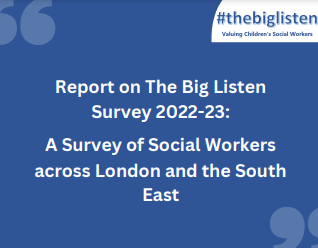Children’s social workers’ ‘passion for job’ as well as ‘serious challenges’ revealed in major workforce survey
A major survey of children’s social workers in London and the south east of England shows the vast majority are passionate about their work, while also pointing to the serious challenges and pressures many face.
The research for the Big Listen project involved 52 local authorities and generated over 1,000 responses – equivalent to 8% of the approximate 12,700 children’s social workers across the two regions. Councils in London and the south east together employ over one third of the 31,600 children’s social workers employed by local authorities across England.
Among the positive findings from the Big Listen report, the survey results reveal that 88% agree or strongly agree that they can make a difference to children and young people through their work.
The survey included social work managers, students, and agency workers as well as council-employed children’s social workers. The majority felt valued in their roles, with 66% agreeing or strongly agreeing.
However, the survey also provides fresh evidence of longstanding workforce concerns. Almost 40% of respondents found their workload unmanageable. Around 20% of respondents from local authorities stated that they intended to work for an agency in future.
Another key finding of the report is the distinct and more negative experience of ethnic minority social workers. The impact of racism and discrimination was a recurring theme in the focus groups and survey work organised as part of the Big Listen. Local authority social workers from ethnic minorities were more likely to cite the cost of living as a major concern and to be considering leaving their posts to work for agencies instead.
The Big Listen was organised as a collaboration between London boroughs and councils in the south east seeking to improve understanding of children’s social workers’ views and priorities.
The recruitment and retention of social workers has been a challenge for decades but there are signs the situation is worsening. In 2022 the number of children’s social workers directly employed by local authorities in England decreased for the first time in five years by 2.7% (or 900 social workers), vacancies increased by 21% (to 7,900), and the use of agency staff increased by 13% (or 6,800).
Councils in London and the south east are determined to work in partnership to address the situation, including through reducing competition over children’s social worker recruitment and improving retention rates.
Cllr Ian Edwards, London Councils’ Executive Member for Children & Young People, said: “The Big Listen has provided us with vital insight. Carrying out the research across the two regions has undoubtedly brought many benefits and presents a good model for future cooperation.
“We’re grateful to all those who shared their views as part of the Big Listen. Now we’re determined to show that those views have been heard as we develop our workforce strategy.”
Mac Heath, Director of Children’s Services at Milton Keynes and Workforce Policy Lead for the South East Region, said: “It is encouraging to have confirmation that many of the workers spoken to as part of the Big Listen were positive about their role as local authority employees, feeling that they were able and supported to make real improvements for the children, families, and communities they work with.
“However, there are key messages that we must listen to. We are committed to working together as councils at local, regional, and national levels to help retain and recruit the high-quality people we need.”
Jacquie Burke, Director of Children’s Services at Hackney Council, and Beverley Hendricks, Assistant Director Safeguarding & Social Care at Haringey Council (Joint Strategic Leads of ALDCS Leadership in Colour Programme), said: “This new research is incredibly useful for revealing the experience of our black and global majority workforces.
“We have to address the structural inequalities in our workplaces that lead to black and global majority workers choosing agency over local authority employers. We must redouble efforts to champion and support change. Our workforce is our most precious asset.”
The Big Listen was carried out by London Innovation & Improvement Alliance (LIIA) in collaboration with the South East Sector Led Improvement Programme (SESLIP).

